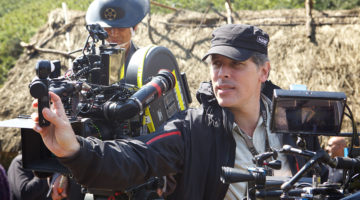Interview: Ira Sachs discusses LITTLE MEN
Ira Sachs (Love is Strange, Keep the Lights On) is one of our favorite filmmakers so we were elated when we had the opportunity to have a cup of coffee with the screenwriter/director a few short hours prior to the Canadian premiere of his latest film, Little Men, at the Inside Out Toronto LGBT Film Festival back in June.
Scene Creek: As I understand it, this film is a deeply personal one for you and your co-writer Mauricio Zacharias. Can you talk a little about its conception?
Ira Sachs: Well all my films are personal because that’s where I find the richest ground in which to make something. If the material doesn’t connect with me in some deep way then I don’t feel like I have anything to offer. This film began with two films by the Japanese filmmaker Ozu. He made a film called I Was Born, But… and then another movie called Good Morning, which are both films about kids that go on strike. I thought that was a really good idea for a story, but then the question became what are the kids going to strike about? Mauricio Zacharias, my co-writer, while we were thinking of this movie, his family was in a big legal battle with a tenant who had a storefront in Rio. So every day I was hearing different chapters of that story and I said, “Well there’s another side to this, for sure.” I thought it was dramatic and relevant to talk about a real estate conflict over a lease. My husband moved to New York when he was ten years old and his Mother was an Ecuadorian single Mom who brought her kid to a new country, and that became part of the story too. He’s a painter who went to LaGuardia High School for the Performing Arts. So I kind of fused the plot of my film with characters or stories that I’d become familiar with. And I had moved to this corner of Brooklyn in 1988 where I was the white college kid moving into an Italian neighborhood on a Dominican street. So all these things became the story of these two families in the film. And the central friendship in the film came from this belief that I have that your strongest memory from childhood is your best friend. With most best friendships something causes that friendship to end, whether it be class or race. When you’re really young you don’t notice these differences the same way as when you just become an adult. We can’t cross those boundaries in the same way we could when we’re ten years old. You’re just not the same. Adults ghettoized themselves in different ways than kids do. Kids are together because they’re drawn together or all in the same room. In this case they’re doing theatre and soccer together and that brings them together. In some ways I wanted to make an adult film about childhood that tried to understand its complexities in a way that would be relevant to both adults and kids. The kids seem to really love this movie. I think they relate to who those kids are and the movie respects their challenges.
SC: The film is very much a love letter to childhood, the many definitions of family, to New York and to cinema itself. Other than the aforementioned Ozu, there are many loving homages to various filmmakers and films in this movie. What should people look out for in particular?
IS: Oh I’d say The 400 Blows. The beauty of that film in terms of its depiction of childhood. There was a film which a lot of people don’t know but I hope this will get more people to rent it – it’s called The World of Henry Orient. It was a film directed by George Roy Hill about two girls from different sides of the track who are best friends and they bond over their love of a classical pianist, played by Peter Sellers. It’s such a great film about New York childhood which I really love.
SC: Which currently working filmmakers do you admire?
IS: Well I feel a great loss that Chantal Akerman is no longer with us. I feel like her rigor and her focus is something that I learned a lot from. Olivier Assayas is an important filmmaker to French cinema and to contemporary French cinema. I loved Xavier Dolan’s last film, Mommy. That was such a fantastic film. I haven’t seen his most recent film yet but I’m very much looking forward to it. It’s interesting but for this film I really loved the film Gloria that Paulina (Garcia) was in. There was a great film from Romania that came out last year that I’d highly recommend and it’s called Child’s Pose. I would say my deepest influences are non American cinema. Although Cassavetes was deeply transformative for me for at least fifteen years, but that’s shifted.
SC: You’ve assembled a brilliant cast that includes seasoned actors like Paulina, Greg Kinnear, Jennifer Ehle and you’ve also brought out beautifully nuanced performances from newcomers Theo Taplitz and Michael Barbieri. What was the casting process like?
IS: Well Paulina I came to because of Gloria. We saw her in that and Mauricio and I wrote the script with her in mind. With Greg Kinnear it was really Auto Focus that drew me to him. His brilliant performance was so complicated and dark and real, just such a tremendous performance. What’s interesting about him is that he totally underplays it all and he’s super comfortable with dialogue. Jennifer Ehle I had seen in a number of things and I feel like she’s always underused. You feel her strength as an actress and as a person. You feel that in her character here and you can imagine a whole world around her. With the boys, the instinctual decision that I made was that I need to find two boys who would be interesting to watch and who would be memorable. Once I found those boys I stopped. I didn’t seen ten thousand kids, I saw maybe a hundred, and I saw these two and knew that I could make a movie with them. That meant changing the script and not forcing them into roles that weren’t them. I think of the character of Jake as the kind of Robert Bresson type of actor and I think of Tony as a kind of Martin Scorsese actor. So I used Jake in a Bressonian fashion and Tony in a Scorsesian fashion. Theo is very interior and deeply felt, you see it all through his eyes. Then Tony I needed to let go in certain places. He’s the one character where you see the most improvisation. In his theatre improv scene, I really liked that the scene was demanding and surprising. It’s a centerpiece scene. And that really was his acting teacher. So, for example, in the original script that boy did capoeira, but since that didn’t fit in with Michael, who was studying at the Lee Strasberg, we changed it to acting. I think I tried to utilize stuff that was natural to him. They’re both amazing kids. To me I have to try to cast all actors who will, without any effort, be in the world of the story that I’m telling.
SC: What else did you change from the original script due to the casting?
IS: Not much, really, but I will tell you one thing that we did change. What’s interesting about being at the Inside Out festival is that the script defined their sexuality more explicitly than the final film does. What I felt, as I started to work with these kids, was that I couldn’t impose their futures on them and I couldn’t define who they would become as adults before they had discovered that themselves. Specifically with Jake, he could be a gay kid, he may not be a gay kid. I wrote the film from the perspective of having been a gay teenager and having friendships but I also knew that the film would be ultimately about friendship. It wasn’t a film about sexuality. So I think that was a big change because it was more conclusive in the script.
SC: The film is also about what children observe and learn from their parents. What are you hoping your children learn from you and the film?
IS: You know I hope a curiosity and a sense of being comfortable with differences so that the world seems inviting and non threatening. That’s really what these kids lose in the end, that ease of difference because they are very different. What tends to happen is that you start matching with the same, whether that is in your community or in partnerships. I’m happy that my kids are growing up in a diverse family, meaning that my nuclear family and my friends don’t look the same. I raise my kids with my husband and their Mom, who lives next door to us, and that’s something that we’re all offering them. I think it’s connected to my filmmaking, to some extent, where I have a Brazilian co-writer and a Chilean actress and in general my films revolve around worlds that aren’t like myself.
SC: I read that you’re working on a film about Montgomery Clift for HBO. Can you tell me anything about that project?
IS: What I can tell you is that there’s a big question mark about whether they’ll make it. You know I’m trying to figure out whether I can work with television, which is a very different medium than film, and still maintain my voice and the storytelling. To do this is a risk for the company because I’m not an inherently commercial filmmaker whose interests aren’t aesthetic first of all. So we’ll see if we come to a place where they’re giving me money to make the film. The process has been fascinating – to try to capture a life in a story. The biopic is an interesting form. We’re trying to tell a macro story, his life from fourteen to forty-six, not a summer with Monte. So the writing process has been fascinating. I am enjoying the process a lot. I’m also adapting an amazing book called Christodora and a new film with Mauricio which I think is about a family climbing a mountain, but I’m not sure.
Little Men is currently playing at the TIFF Bell Lightbox in Toronto.



